Financial and Stock Markets Hit by Collapsing Euro Currency
Stock-Markets / Financial Markets 2010 May 15, 2010 - 04:32 AM GMT U.S. Michigan Consumer Sentiment Index Rose to 73.3 in May - Confidence among U.S. consumers increased in May, a sign the biggest part of the economy is helping strengthen the expansion.
U.S. Michigan Consumer Sentiment Index Rose to 73.3 in May - Confidence among U.S. consumers increased in May, a sign the biggest part of the economy is helping strengthen the expansion.
The Thomson Reuters/University of Michigan preliminary index of consumer sentiment rose to 73.3 from 72.2 in April. The gauge was projected to rise to 73.5, according to the median forecast in a Bloomberg News survey.
The outlook appears rosy, indeed. Now, if only the markets will agree.
Germany Loses Control Over Its Currency and wants out.
Romano Prodi recalls how he persuaded Germany to allow debt-swamped Italy into the euro: support our membership and we’ll buy your milk, he said. Germany got the message, allowing entry rules to be bent to create a 16-nation market for its exporters. Now, German taxpayers are footing the bill for that permissiveness as Europe bails out divergent economies lashed to a single currency with little control over national taxes and spending.
The consequences are an 860 billion-euro ($1 trillion) bill for a debt binge led by Greece, sagging confidence in the European Central Bank’s independence and mounting speculation that a currency designed to last forever might break apart.
France may join the exit of the Euro, too.
The markets were initially unsettled by news that the French president had threatened to pull France out of the eurozone. The startling threat was made at a Brussels summit of EU leaders last Friday, at which the deal to bail out Greece was agreed, according to a report in El País newspaper quoting Spanish Prime Minister José Luis Rodríguez Zapatero.
Will the S&P Index move below 950 next?
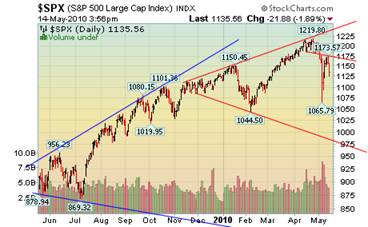 --After more than a 4% gap-up rally on Monday, the S&P Index could only sustain its upward momentum until Wednesday. The European bailout was just too good to be true. As we see the European leaders unable to agree on the terms of the bailout, it appears that the markets are now spinning out of control again. One issue that hasn’t been addressed is “qui bono?” Is it the banks, again?
--After more than a 4% gap-up rally on Monday, the S&P Index could only sustain its upward momentum until Wednesday. The European bailout was just too good to be true. As we see the European leaders unable to agree on the terms of the bailout, it appears that the markets are now spinning out of control again. One issue that hasn’t been addressed is “qui bono?” Is it the banks, again?
Traders are getting their nerve back to buy Treasuries again.
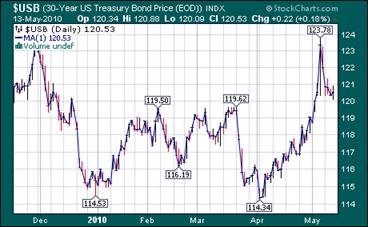 --Today’s rally in the 30-year Treasury Bond erased an earlier weekly loss as traders regain their confidence in the rally going strong since April. Yields fell again today as investors sought to guard against a potential meltdown in stocks caused by the fear of a sovereign debt crisis that would bleed over into a worldwide banking crisis. Global uncertainties seem to be outweighing today’s “good news” about rising consumer confidence.
--Today’s rally in the 30-year Treasury Bond erased an earlier weekly loss as traders regain their confidence in the rally going strong since April. Yields fell again today as investors sought to guard against a potential meltdown in stocks caused by the fear of a sovereign debt crisis that would bleed over into a worldwide banking crisis. Global uncertainties seem to be outweighing today’s “good news” about rising consumer confidence.
Is gold getting overbought?
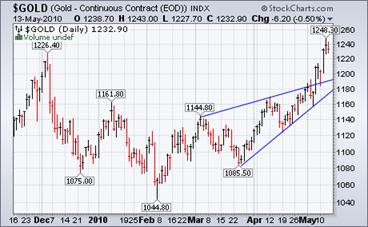 -- Gold eased back today, after a blistering rally earlier this week to new highs. Gold is headed for a weekly gain for four straight weeks.The precious metal reached an all-time high of $1,249.70 an ounce in New York, the third time prices touched a record this week. The 14-day relative strength index for gold futures neared 70 today, a signal that prices may be poised to fall soon.
-- Gold eased back today, after a blistering rally earlier this week to new highs. Gold is headed for a weekly gain for four straight weeks.The precious metal reached an all-time high of $1,249.70 an ounce in New York, the third time prices touched a record this week. The 14-day relative strength index for gold futures neared 70 today, a signal that prices may be poised to fall soon.
Nikkei erased part of its weekly gain.
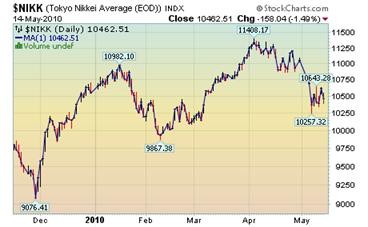 -- Japanese stocks fell the most this week after Sony Corp. forecast profit that missed analyst estimates, the euro and dollar weakened against the yen and commodity prices declined. The Nikkei 225 Stock Average fell 1.5 percent to 10,462.51 at the 3 p.m. close in Tokyo, the biggest slide this week. For the week, the Nikkei is up 0.9 percent and the Topix has gained 0.5 percent.
-- Japanese stocks fell the most this week after Sony Corp. forecast profit that missed analyst estimates, the euro and dollar weakened against the yen and commodity prices declined. The Nikkei 225 Stock Average fell 1.5 percent to 10,462.51 at the 3 p.m. close in Tokyo, the biggest slide this week. For the week, the Nikkei is up 0.9 percent and the Topix has gained 0.5 percent.
China has its first positive week in 6.
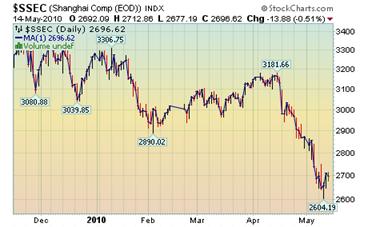 -- China’s stocks fell, paring a weekly gain, on concern government tightening measures including possibly a property tax and European nations’ debt- cutting will hurt global economic growth. The Shanghai Composite Index retreated 13.9, or 0.5 percent, to 2,696.63. The gauge advanced 0.3 percent this week, the first weekly gain in six.
-- China’s stocks fell, paring a weekly gain, on concern government tightening measures including possibly a property tax and European nations’ debt- cutting will hurt global economic growth. The Shanghai Composite Index retreated 13.9, or 0.5 percent, to 2,696.63. The gauge advanced 0.3 percent this week, the first weekly gain in six.
The Euro extends losses against the dollar.
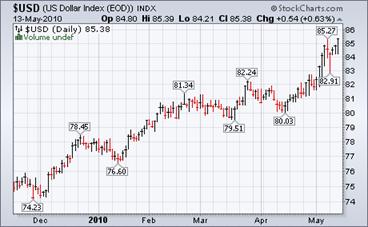 -- The euro dropped under $1.24 to its lowest level since October 2008, extending its losses Friday against the dollar and yen amid renewed fears of fallout from the euro-zone debt crisis. The common currency tumbled as far as $1.2358, down 1.35% on the day, while losing 2.2% versus the yen and 0.6% against the U.K. pound. Since the beginning of 2010, the euro has lost about 13.5% against the greenback.
-- The euro dropped under $1.24 to its lowest level since October 2008, extending its losses Friday against the dollar and yen amid renewed fears of fallout from the euro-zone debt crisis. The common currency tumbled as far as $1.2358, down 1.35% on the day, while losing 2.2% versus the yen and 0.6% against the U.K. pound. Since the beginning of 2010, the euro has lost about 13.5% against the greenback.
There wasn't any fresh development that spurred the euro's latest slide, but was simply an extension of earlier losses as London traders exited the market for the week.
Home Foreclosures reach a record in April.
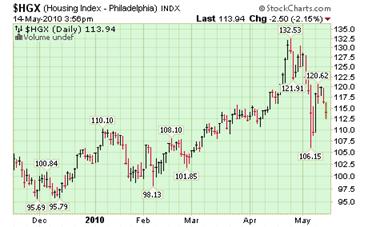 U.S. home foreclosures climbed to a record in April, a sign that government mortgage relief efforts have yet to turn the tide of property seizures, according to a report by RealtyTrac Inc. “Right now it appears that the banks are focusing on processing the loans already in foreclosure, and slowing down the initiation of new foreclosure proceedings as a way of managing inventory levels,” Rick Sharga, RealtyTrac’s executive vice president, said in an e-mail. “We’ll probably see this trend continue for a while.”
U.S. home foreclosures climbed to a record in April, a sign that government mortgage relief efforts have yet to turn the tide of property seizures, according to a report by RealtyTrac Inc. “Right now it appears that the banks are focusing on processing the loans already in foreclosure, and slowing down the initiation of new foreclosure proceedings as a way of managing inventory levels,” Rick Sharga, RealtyTrac’s executive vice president, said in an e-mail. “We’ll probably see this trend continue for a while.”
Refiners gearing up for Memorial Day weekend.
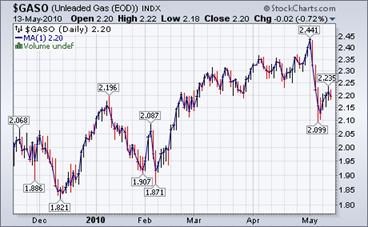 The Energy Information Agency weekly report observes, “As Memorial Day weekend approaches, many consumers are starting to pay more attention to gasoline prices, which have risen by about 11 cents per gallon since the end of March. Domestic refineries, which produce most of our gasoline, have already been gearing up for the upcoming summer driving season by switching over to the production of summer-grade products and preparing for higher utilization rates. Prices are influenced by three main factors: the change in price of the major feedstock, crude oil, the higher cost to produce summer-grade gasoline, and changes in refiner margins.”
The Energy Information Agency weekly report observes, “As Memorial Day weekend approaches, many consumers are starting to pay more attention to gasoline prices, which have risen by about 11 cents per gallon since the end of March. Domestic refineries, which produce most of our gasoline, have already been gearing up for the upcoming summer driving season by switching over to the production of summer-grade products and preparing for higher utilization rates. Prices are influenced by three main factors: the change in price of the major feedstock, crude oil, the higher cost to produce summer-grade gasoline, and changes in refiner margins.”
Natural Gas inventories are slowing down.
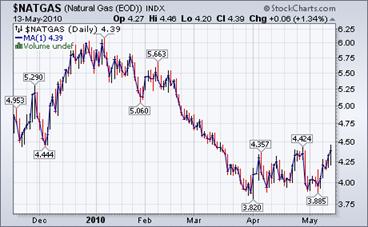 --Natural gas futures fell Friday, but remained within a narrow price range as profit-taking and mild weather counterbalanced signs of a possible slowdown in gas storage injections.Gas traders were selling contracts to take advantage of higher prices after a government report Thursday showed a smaller-than-expected build in gas inventories for last week. David Rosenberg: “Why the Depression is ongoing.”
--Natural gas futures fell Friday, but remained within a narrow price range as profit-taking and mild weather counterbalanced signs of a possible slowdown in gas storage injections.Gas traders were selling contracts to take advantage of higher prices after a government report Thursday showed a smaller-than-expected build in gas inventories for last week. David Rosenberg: “Why the Depression is ongoing.”
There are classic signs indeed that the recession in the U.S. ended last summer — output, sales, etc. But the depression is ongoing and the reason we say that is because real personal income, excluding handouts from the government, has barely budged. In fact, real organic personal income is nearly $500 billion lower now than it was at the peak 16 months ago and this has never occurred before coming out of any technical recession. It is a depression, as the chart below attests — that is the trendline for real household incomes, until the government comes in to top them off with handouts, subsidies and extended jobless benefits. The share of U.S. personal income being derived from Uncle Sam’s generosity has risen above 18% for the first time ever.
Where's Sarkozy When We Need Him?
Five days ago French President Sarkozy said:
“We will confront speculators mercilessly.”
The only speculators who got “confronted” in the last few days are the speculators who bet that this plan would work.
The White House must be livid. From reports it is clear that Obama was involved in hatching the EU TARP. He must have pushed on Bernanke to open the swap windows. The President told the Europeans the plan had to have teeth. Five days later the US is getting sucked down the European rat hole. There is no bazooka to save the Euro.
Traders alert: The Practical Investor is currently offering the daily Inner Circle Newsletter to new subscribers. Contact us at tpi@thepracticalinvestor.com for a free sample newsletter and subscription information.
Our Investment Advisor Registration is on the Web
We are in the process of updating our website at www.thepracticalinvestor.com to have more information on our services. Log on and click on Advisor Registration to get more details.
If you are a client or wish to become one, please make an appointment to discuss our investment strategies by calling Connie or Tony at (517) 699-1554, ext 10 or 11. Or e-mail us at tpi@thepracticalinvestor.com .
Anthony M. Cherniawski, President and CIO http://www.thepracticalinvestor.com
As a State Registered Investment Advisor, The Practical Investor (TPI) manages private client investment portfolios using a proprietary investment strategy created by Chief Investment Officer Tony Cherniawski. Throughout 2000-01, when many investors felt the pain of double digit market losses, TPI successfully navigated the choppy investment waters, creating a profit for our private investment clients. With a focus on preserving assets and capitalizing on opportunities, TPI clients benefited greatly from the TPI strategies, allowing them to stay on track with their life goals
Disclaimer: The content in this article is written for educational and informational purposes only. There is no offer or recommendation to buy or sell any security and no information contained here should be interpreted or construed as investment advice. Do you own due diligence as the information in this article is the opinion of Anthony M. Cherniawski and subject to change without notice.
Anthony M. Cherniawski Archive |
© 2005-2022 http://www.MarketOracle.co.uk - The Market Oracle is a FREE Daily Financial Markets Analysis & Forecasting online publication.



